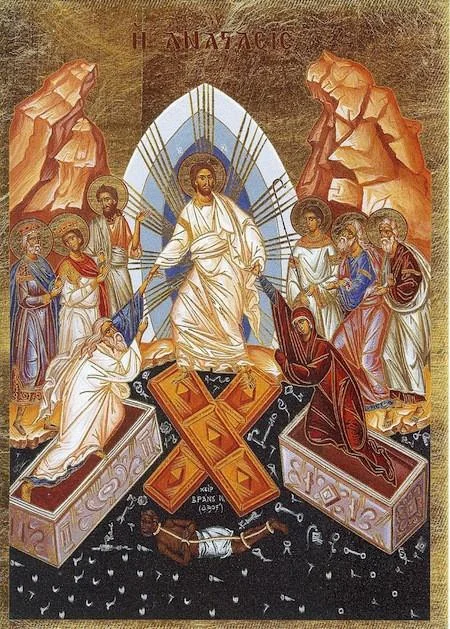Welcome to Easter week! The season where we Americans buy and eat a ton of candy, decorate and find Easter eggs (isn't it weird that a bunny makes all kinds of eggs?!?), take pictures with a person in a often times creepy human sized Easter bunny costume, and where over a billion people celebrate the resurrection of Jesus.
All of that seems kinda strange, right? And I'm not only talking about our American Easter traditions. It is strange that a man was dead for a few days and then became alive again. And by strange, I mean unusual. That is kind of an understatement. I've never heard of another person being killed by professional executioners and then put in a tomb for days and then coming back to life. Have you? I've never seen a resurrection. So when I hear people who're skeptical, I can be quite empathic.
Pastor and author Tim Keller lives in New York City. Because he lives in one of the most skeptical cities in the U.S., he hears from a fair share of people who have a hard time with the claims of Jesus coming back to life. He writes in his book, The Reason for God:
"Sometimes people approach me and say, 'I really struggle with this aspect of Christian teaching. I like this part of Christian belief, but I don’t think I can accept that part.' I usually respond: “If Jesus rose from the dead, then you have to accept all that he said; if he didn’t rise from the dead, then why worry about any of what he said? The issue on which everything hangs is not whether or not you like his teaching but whether or not he rose from the dead.”
And it is not just Keller who argues the lynchpin of the Christian faith is the resurrection, even one of the main authors of the Bible says the same thing.
And if Christ has not been raised, then your faith is useless and you are still guilty of your sins. In that case, all who have died believing in Christ are lost! And if our hope in Christ is only for this life, we are more to be pitied than anyone in the world. - Paul in 1 Corinthians 15:17-19
Strong words from one of the authors of the Bible right?!? IF Jesus has not been raised, then it all falls apart and Christians should be pitied like no other.
So let's look at a few historical events that support and give evidence that Jesus actually DID rise from the grave. Despite how ridiculous it might seem, the empty tomb is the best explanation for 1) The disciples' changed lives and 2) The change in worship for thousands of first century Jews.
First, let's look at the disciples (the twelve, mostly blue-collar, normal Joe's who followed Jesus for three years during his ministry before he was crucified). Before Jesus' resurrection we see them act like this:
“Then all the disciples left him and fled.” (Matthew 26:56). Peter denies Jesus three times, once even to a slave girl. “Then he began to invoke a curse on himself and to swear, ‘I do not know the man.’ And immediately the rooster crowed.” (Matthew 26:74). After Jesus’ death, they were cowering in a locked room, terrified that the Jewish religious rulers would come after them next.
But something happened that changed this bunch of terrified cowards who feared for their lives into nearly unrecognizable people. “Then Peter, filled with the Holy Spirit, said to them, ‘Rulers of the people and elders’ (the same people that they were hiding from)...Now when they saw the boldness of Peter and John, and perceived that they were uneducated men, they were astonished. And they recognized that they had been with Jesus.” - Acts 4:8, 13.
Tradition also teaches that all the disciples were martyred, minus Judas the betrayer. (The authorities tried to kill the disciple John by boiling him alive but he survived and so instead they exiled him to an island for the rest of his life.) They were killed in horrific ways because they wouldn't stop telling the world that Jesus was alive! The resurrection had changed them from terrified cowards into fearless martyrs! People tend to not die for something they know is a lie, especially when they get nothing good out of it (only poverty, persecution, imprisonment, and death).
Not only were the disciples' lives changed but worship completely changed for thousands of first century Jews. Now this might not sound like a big deal. "Hey, I've switched churches throughout my life or changed my views on religion and doctrine," you might say. But let's look at what would have to happen for thousands and thousands of first century Jews to change how they worshiped the LORD.
First, worship was no longer on the Sabbath. The first Christians didn't observe the Sabbath. This is a BIG deal. According to the law, if you desecrate the Sabbath, you get stoned (and I don't mean the Cheech and Chong kind of stoned). If you work on the Sabbath, you get cut off from the Jewish nation. Capital Punishment AND being excommunicated from your family and people is a BIG deal! Yet the early Christians intentionally chose to stop observing the Sabbath and to worship Jesus on a new day (Sunday).
Second, there was no longer a physical temple, priest, or sacrifice needed to worship God. For over a thousand years the Jewish people worshiped God in a certain way. But after Jesus' death and resurrection, something big changed. Jesus himself was the fulfillment of the temple, the priesthood, and was the ultimate and final sacrifice for forgiveness of sins.
The third way that worship changed was Gentiles (any ethnicity, race, or nationality that wasn't Jewish) were now fully included. Again, for over a thousand years Gentiles were not fully included. Even if a Gentile converted to Judaism, they were still an outsider (think things like having their own outer court in the temple and not being able to fully participate in worship as the ethnic Jews were).
Fourth, the church was founded around two sacraments (acts that were performed over and over again to demonstrate and remember something): baptism and the Lord's Supper/Communion. Both of these sacraments are symbolic of Jesus's death and resurrection. So the acts that the church gathered around on a consistent basis were based on their belief that Jesus DID rise from the grave.
Fifth and finally, they worshiped a man. Almost no one argues that there wasn't a real human named Jesus who lived in the first century. Whether or not he was God is obviously debated but very few think that he wasn't a real man. Now whether or not you know much about Judaism, one main rule is you can only worship God. Not idols. Not statues. Not multiple gods. And especially NOT humans. But what happens just days after Jesus' death? Thousands of Jews start worshiping a MAN. Why would they risk their eternal punishment in Hell by breaking the number one rule in Judaism? Because they believed that Jesus wasn't just a man (although he was fully man) but that he was also fully God himself. They believed he was who he said he was, the Son of God who added humanity to his divinity so that he could die the death that we deserved and in our place.
So the disciples risked execution, excommunication from their family, being traitors to their religion and nation, and eternity in hell. And like we said before, they all got nothing earthly out of it besides pain, suffering, and execution. Something must have happened. People don't just risk all of that and go through all of that unless something truly impossible happened.
On Sunday morning, the Son of God rose from the grave. He defeated death, proving he was God incarnate, worthy of worship and allegiance. He changed the lives of a few thousand people in the Ancient Near East, who in turn literally changed the world. What can account for all of this? The answer is the resurrection of the God-man, Jesus Christ.
The original hearers knew that if the resurrection "was true it meant we can’t live our lives any way we want. It also meant we don’t have to be afraid of anything, not Roman swords, not cancer, nothing. If Jesus rose from the dead, it changes everything.” -Tim Keller.
Jesus invites us to believe this Easter: “I am the resurrection and the life. Anyone who believes in me will live, even after dying. Everyone who lives in me and believes in me will never ever die. Do you believe this?” - John 11:25-26
SPENCER PETERSON / COMMUNITY LIFE PASTOR









